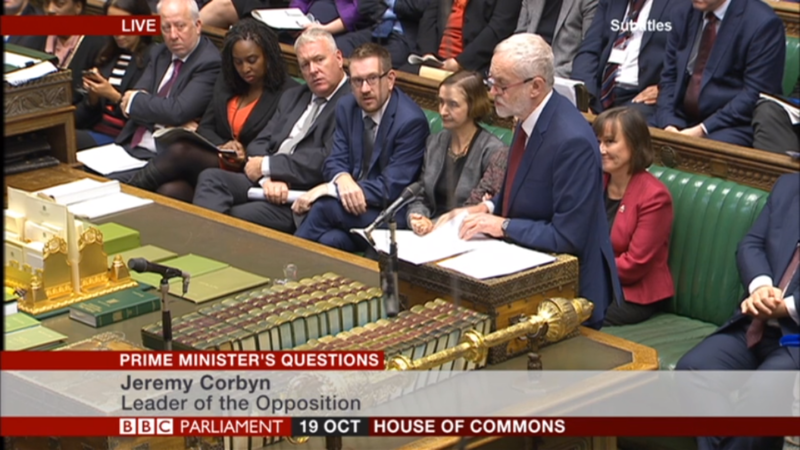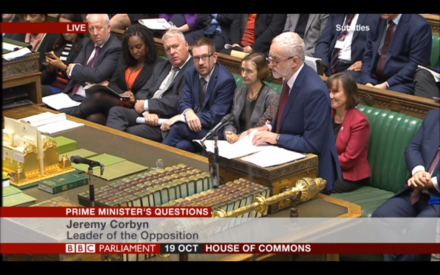

Tough questions, but were they the right ones? Jeremy Corbyn pressed Theresa May today on two issues of vital national importance but failed to land a blow on the storms which have swirled around the Conservative Cabinet over the last week.
MPs waited in vain for him to inflict the killer questions on Brexit, Heathrow and the chaos surrounding the child abuse inquiry but they never came.
Instead Corbyn focussed on mental healthcare and the related problem of NHS trust deficits. It was serious, sensible stuff but left him accused of neglecting two of the subjects which have gripped MPs from all parties in recent days.
First, the good bits. Corbyn returned to one of his favoured topics – the neglect of the mentally ill and whether the Tories have achieved “parity of esteem” with the treatment of physical problems.
May didn’t have a full answer. Instead, as Corbyn pushed further, the PM used her tried and tested tactic of retreating to some general statements of concern before switching to some lines from the Tory manifesto. In six years, however, the NHS has gone from “a surplus to the worst financial crisis in its history”, the Labour leader said.
Corbyn built up a head of steam and seemed to throw May with the demand for “no downgrades and no closures” of Accident and Emergency departments. It prompted a rattled response in which, quite bizarrely, May accused Labour of wanting a “top-down” approach to the NHS.
“Wow, wow, because top down is what we got”, said Corbyn, who couldn’t believe his luck.
“I talked about parity of esteem. All this Government has produced is parity of failure.”
Indeed. May seemed to walk right into that one. It was an underwhelming performance from a PM who is good on the scripted put-downs – often delivered with icy disdain – but who doesn’t like veering off plan.
As for Corbyn, it was a decent day for mental health but one that left many wondering why he didn’t push at the cracks which seem to be undermining the Government just months after it was appointed.
This was a week that has seen the future of the chancellor edge into doubt over his handling of the pumped-up Brexiteers around the Cabinet table, as well as a further delay over Heathrow, while tumbleweed continues to blow through the space in Whitehall where the plan for Brexit is supposed to be lodged.
Corbyn picked out subjects of significance and often seems comfortable chucking in a lot of detail, which is one way of trying to catch out his opponent. But where was the brutal question on the rows in May’s top team or the zinger of a comeback that would earn him a place on the six o’clock news?
Yes, PMQs is a place for serious debate but Corbyn should bear in mind the old adage that the lunchtime duel is the one piece of politics that millions of people, busy elsewhere, might take in each week.
We know Corbyn rarely does jokes. His style is serious, so he may as well stick to it but he can still use the force of his arguments to pull apart the lofty May, who sometimes seems to treat him as an over-eager sixth former.
May herself did try to lob in a few jokes but this time found one came back to hit her. When Tory backbencher Peter Bone coupled a question about his local prison with a reminder that today is his birthday, May suddenly seemed to be gripped by the spirit of a stand-up comedian.
“I hope Mrs Bone is going to treat the occasion in the appropriate manner,” she grinned.
Ha, ha. Or rather, oh dear. Whoever devised that double entendre in the comfort of Downing Street cannot have realised quite how excruciating it would feel in the Commons chamber. Yes, there were gales of laughter from the Tory benches but I only wish the squirms of Opposition MPs and spectators could be heard too, because there must have been many.
Jokes over, there were more serious discussions to come. Lisa Nandy, now a backbencher, rightly tackled the controversy of the week when she asked May when she first knew about the “serious problems” which have enveloped the child abuse inquiry. Dame Lowell Goddard has resigned as its head and since been accused of incompetence and using racist language – claims which she has vehemently denied in detail.
May’s answer was meant to be emphatic but came across as slightly evasive. “There were stories around about the inquiry… But the Home Secretary cannot intervene on the basis of suspicion, rumour or hearsay.” May’s admission over these “stories” ensured it would be the Government’s contrasting answers about the handling of a major inquiry, rather than its treatment of the mentally ill, that dominated the day.
Corbyn stuck to his principles. He is recognised for this by both friend and foe. Surely, however, he could use that thirst for justice for the poor and the sick to speak up on the hottest political issues of the day. Nandy’s question underlined the fact that Labour’s most vocal campaigners are now spread over the front seats and the backbenches.




More from LabourList
SPONSORED: ‘Industrial hemp and the challenge of turning Labour’s priorities into practice’
‘A day is a long time in politics, so we need ‘action this day’’
Strong support for child social media ban among Labour members, poll reveals